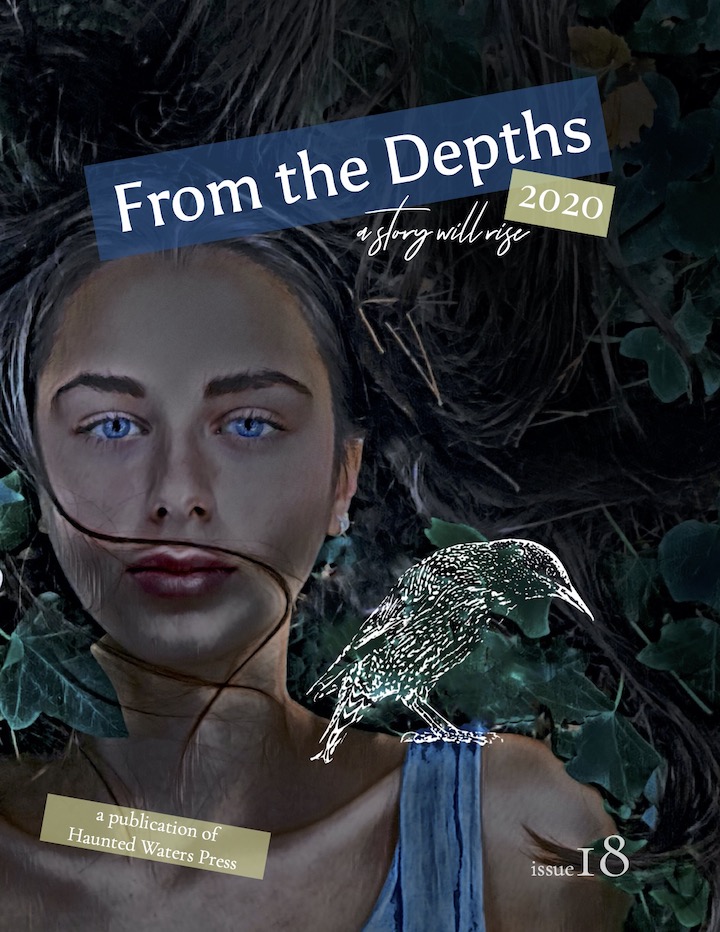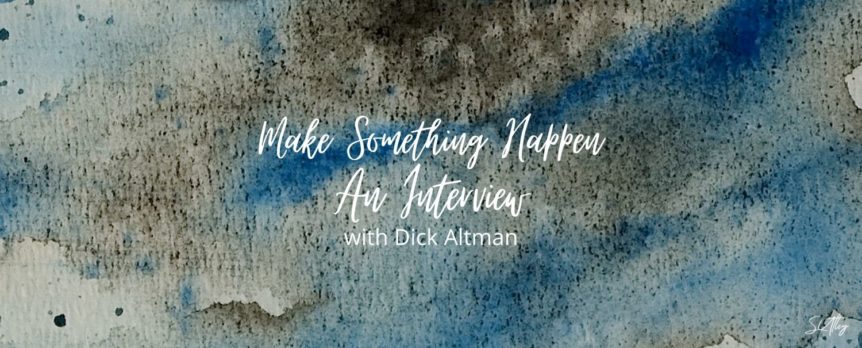Greetings, dear readers! Today we chat with frequent HWP Contributor Dick Altman. One of the many joys of running a small press is in the relationships we form with our contributors. Over the years, many of these editor/author connections have blossomed into lasting friendships—some more quickly than others.
Upon accepting Dick's poem Glitter Fishing Rio Grande's Gorge for publication in the 2020 issue of From the Depths, we knew it was the beginning of something special. Dick's candid notes filled with encouraging words and high altitude hugs were welcome blessings during difficult times. For that, we are truly grateful. We and our readers are also thankful for a continuous stream of beautifully crafted poetry. Dick’s poems Songs of Love, But Not for Her and Vulture of a Day can be found in the pages of SPLASH!, and If You Can 3D-Print a House, Why Not a Poem? and Life at 7,000 Feet are upcoming.
Enjoy!
I began as a freshman in college to read Lorca in Spanish. "A Las Cinco de La Tarde"—at five in the afternoon—stunned me. It depicts a friend's death in the bullring. Anchoring the poem is the dirge-like, drumbeat repetition of the title. The work's power in its simplicity left a mark. By the time I'd been selected for the English department's senior honors program, I wanted to write my thesis on Lorca. The chairman nearly threw me and the idea out the door. Thankfully, I never let go of the poem or its author.
How long did it take you to find your voice in your poetry? Do you look back on your early writing and see the ways in which you have grown as a writer?
I built a career writing endlessly for the prose world. You needed to write with precision, power, and persuasion. I remember a client calling me "a corporate poet". The image stuck. I began to write poetry as a break from prose. It began, in turn, to imbue my prose with a lyricism I never could have predicted. No metaphors, thank you—but it softened the edges. I often think prose unfolds and poetry explodes. Stanzas initially felt like paragraphs. Paragraphs now feel much more like stanzas. Poetry delivers a lot in a little. I strive for that now in prose. In the end, one rubs off on the other, enhances the other.
Poetry's open-ended. There are no guarantees. Though stumbling's a fair certainty.
—Dick Altman
We’d love to know more about your process for writing poetry. Do you sit down to write on a schedule, or rush for a pen and paper when an idea strikes?
Conversations give birth to ideas. Poetry itself, which I read incessantly, often provides impetus. I'd call myself a compulsive writer and editor. I do one or the other or both every day. My composer father used to say, "Never fall in love with a line". It's not unusual for me to look back on five, 10, even 20 versions of poems. Rejection's a great spur, if you're writing for publication. Especially if the same version gets kicked back several times. And so back to the anvil, I return.
Do you find your poetry driven more by truth or fiction? How much personal experience makes its way into your writing?
Nobel laureate Louise Gluck says poetry's not a decanting of her personal life, but life as she envisions it. The thought liberated me. Poetry feels like a gumbo of narrative, spiced by fact and fiction, enriched by imagination, seasoned to taste with experience. Nobel winner Isaac Bashevis Singer puts it this way: "Art that is true isn't true". Is my work based more on truth or fiction? I'll answer smilingly "yes".
What advice do you have for the self-conscious aspiring poet?
Be fearless. Go for more, not less. Get a first draft down—and ask yourself, "Do I really need the first stanza or two?" You're not failing—you're learning. Read as much contemporary poetry as you have time for. By today's standards, poetry can be anything you want it to be. Remember: Prose walks, poetry runs. Two people, in effect, catalyze your poem—reader and you. Say something that grabs the other's mind and holds on. No word is set in stone. Unhappy with the page in front of you? Print it out and start over.
Writing is already a fairly solitary endeavor. How would you say the pandemic has affected you as a writer?
Poetry's a great single-handed sport for compulsive minds. I fall into that category, and Covid's given me more time on the court. Covid, sad to say, has inspired several published poems. With more in the revisionary wings.
When you’re not writing poetry, what might we find you doing?
I write "classical lite" for piano, hit thousands of tennis balls a week in search of the elusive perfect ball, eat/read poetry for breakfast, lunch and dinner, strive/struggle to grow trees in the high/dry desert of New Mexico, ride four to six miles a day on the elliptical, power walk our hills for another two or three, and inhale via a doubled-layered mask the poetry of life at 7,000 feet, overlooking the mythical Rio Grande Valley.
What are you reading right now?
I'm right on the cusp of finishing Jorge Luis Borges' Selected Poems. It's decades since he died, but so much of his work feels as fresh and powerful as yesterday. He's a master at saying a lot in a little. Some of his most poignant poems explore his approaching blindness. How extraordinary to find lyricism in life when day turns totally into night. I return to him again and again.
What words do you live by? Do you have a personal motto?
"Make something happen" perhaps best epitomizes who I am. If anybody came to read the meters of my life, I'd like to think they'd find an unusually elevated desire to make something happen with words. They're the adobe bricks of my day, cast in the sun of my mind, stacked one by one to resemble a poem. Often to watch them crumble before I start over.
If you could tell your younger writing self anything, what would it be?
After decades of writing for others, targeting audiences fully fleshed out in your mind, the hardest thing will be writing for yourself. You were always sure of what was required in the prose world. Poetry's open-ended. There are no guarantees. Though stumbling's a fair certainty. If you're after publication, one wrong word, one awkward phrase, will cut you from the running. Polish, polish, and then polish some more. Be sure to save the music.


Lightning Round with Dick Altman

ABOUT THE AUTHOR
Dick Altman grew up the son of a composer in a household overflowing with words and music. Though he practiced piano three hours a day by age 11, his true passion turned out to be words. He earned a BA in English from Lafayette College and an MA from the University of Chicago. He wound up owning a New York City-based agency that created brand voices for Consumer and Corporate America. He writes from Santa Fe, NM, and has appeared in publications here and abroad. His first poetry collection, Voices in the Heart of Stones, is being considered for publication.
Share this Post

